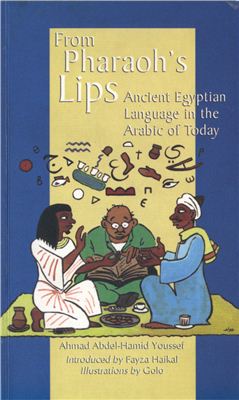Publisher: The American University in Cairo Press, 2003. 131 p.
Language: English with Middle Egyptian, Coptic and Egyptian Arabic
From the most distant past to the mode day, some things never change - including words. The mode Egyptian Arabic dialect is one of the most distinctive in the Arabic-speaking world precisely because of its illustrious heritage from the country's ancient past.
Ahmad Abdel-Hamid Youssef spends a day in the Egyptian countryside, taking note of the many expressions that once fell from the lips of the ancient Egyptians and that continue to be heard on the tongues of the mode Egyptians in their everyday speech. His charming tale of Bayoumi, a farmer, his wife Sawsan and their baby provides the backdrop for tracing the persistence of these words and phrases. What these average Egyptians do, what tools they use, what they eat, how they organize their life, even how they all interact - all can be described with words that hark back to the age of pharaohs such as Khufu and Rameses II.
In telling his story, Youssef integrates the ancestry of these common expressions, with the ancient Egyptian hieroglyphs and Coptic and Arabic words appearing alongside transliterations and translations into English. Both entertaining and instructive, this volume includes a series of glossaries in Egyptian, Coptic and Arabic.
Language: English with Middle Egyptian, Coptic and Egyptian Arabic
From the most distant past to the mode day, some things never change - including words. The mode Egyptian Arabic dialect is one of the most distinctive in the Arabic-speaking world precisely because of its illustrious heritage from the country's ancient past.
Ahmad Abdel-Hamid Youssef spends a day in the Egyptian countryside, taking note of the many expressions that once fell from the lips of the ancient Egyptians and that continue to be heard on the tongues of the mode Egyptians in their everyday speech. His charming tale of Bayoumi, a farmer, his wife Sawsan and their baby provides the backdrop for tracing the persistence of these words and phrases. What these average Egyptians do, what tools they use, what they eat, how they organize their life, even how they all interact - all can be described with words that hark back to the age of pharaohs such as Khufu and Rameses II.
In telling his story, Youssef integrates the ancestry of these common expressions, with the ancient Egyptian hieroglyphs and Coptic and Arabic words appearing alongside transliterations and translations into English. Both entertaining and instructive, this volume includes a series of glossaries in Egyptian, Coptic and Arabic.

